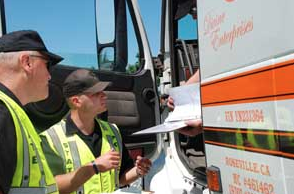The CVSA 72-Hour Roadcheck Starts on June 4—Are You Ready?
EXCLUSIVE TO Fleet News Daily by Adam Kahn, Director, Product Marketing, Omnitracs, Inc.: This week marks the 25th annual Commercial Vehicle Safety Alliance (CVSA) Roadcheck, a 72-hour period in which CVSA-certified inspectors post up around the country to effectively inspect 14 commercial vehicles per minute.
During the few minutes it will take you to read this article, one of the three dozen or so vehicles stopped could be yours! So, whether you’re familiar with the program or not, it’s important to understand the aim of the CVSA Roadcheck so you are prepared to avoid potential out-of-service violations.
What exactly is the CVSA Roadcheck? The CVSA, in conjunction with Federal Motor Carrier Safety Administration (FMCSA), has set up 1,500 checkpoints from Canada down to Mexico for a 72-hour period. This year, the program starts today, June 4, and ends June 6, 2013. These sanctioned checkpoints will be manned by 10,000 inspectors pulling over all passing commercial vehicles to identify any violations and issue tickets. And, while the program may seem cruel, it’s important to remember that it’s in place to promote safety. In fact, the CVSA claims more than one million inspections since the inception of the program—helping save more than 220 lives and avoid 4,045 injuries by removing or prompting repairs of unsafe vehicles.
Okay, now you agree, maybe the program isn’t cruel, but from the perspective of a driver, fleet manager or owner it’s still daunting. In order to successfully pass through Roadcheck week, fleets must be prepared and it’s never too early to get ready for future checks. So, how do I prepare, you ask?
The first thing an inspector will do, after pulling over a vehicle, is ask for the driver’s logbook. If the driver is using a paper logbook, it is more likely he or she hasn’t written in their latest information, making it pretty easy for the inspector to identify a violation. During Roadcheck week, the majority of violations are related to HOS, so it’s important drivers and fleets remain vigilant about keeping logbooks up-to-date and closely plan routes to preemptively avoid HOS complications. If you are still using paper logbooks, it might be a good time to invest in electronic logs (eLogs). eLogs capture driver hours automatically in near-real-time and provide fleets better visibility into available hours, resulting in improved fleet management. eLogs can also deliver in-cab alerts related to impending violations to help carriers take preemptive action before issues occur.
Other common violations during Roadcheck week are mostly related to the vehicle. Whether it’s defective lighting or an incomplete driver vehicle inspection report (DVIR), inspectors can easily identify these mistakes and issue citations that damage a fleet’s Compliance Safety Accountability (CSA) score. Similar to how eLogs can assist with HOS compliance, there is an abundance of technology available to ensure your vehicle and DVIR passes the test. For example, Omnitracs offers a simple, electronic and automated DVIR solution that increases drivers’ near-real-time reporting accuracy, helping to improve the defect resolution process by identifying and allowing fleets to quickly address repair issues before a potential violation occurs.
Remember, while it’s important to get through the CVSA Roadcheck violation free, it’s also important to continue practicing safe and compliant driving during the other 362 days of the year. Look into eLogs and other advanced fleet management technology today, so when the program rolls around again you can be confident in your fleet.
Category: General Update, Management











